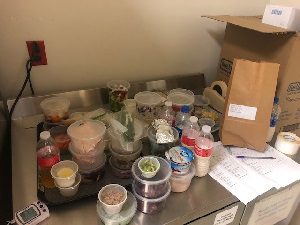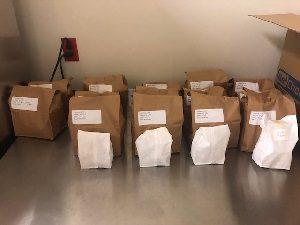The pictures of food in this article may look like they’re from a regular grocery run, but don’t be fooled. Each morsel or liquid you see has been weighed – down to the gram or tenth of a gram sometimes – and specially prepared for participants in specific research studies. This program is offered by a research dietitian through Indiana CTSI.
 “Eating is something we all do every day,” said Rachel Bordogna, RD, CD, who works as a research dietitian. “It sounds so obvious, but we all do it so differently. I think there’s a really limited understanding of how that may impact a drug or behavioral intervention or treatment of some kind, how our food choices might moderate that exposure. Being able to control that pretty significant variable to exactly what people are eating helps us understand how a drug or treatment’s effectiveness is in an individual.”
“Eating is something we all do every day,” said Rachel Bordogna, RD, CD, who works as a research dietitian. “It sounds so obvious, but we all do it so differently. I think there’s a really limited understanding of how that may impact a drug or behavioral intervention or treatment of some kind, how our food choices might moderate that exposure. Being able to control that pretty significant variable to exactly what people are eating helps us understand how a drug or treatment’s effectiveness is in an individual.”
 Bordogna consults with investigators about nutritional components in their research protocol, which could involve a specialized diet, controlling for certain macro-nutrients or micro-nutrients or weight management. Not only does she help design the meal plans with specialized software, but she also can make the food in her kitchen at the University Hospital CRC. She says that can be especially helpful in adding a layer of control in a study.
Bordogna consults with investigators about nutritional components in their research protocol, which could involve a specialized diet, controlling for certain macro-nutrients or micro-nutrients or weight management. Not only does she help design the meal plans with specialized software, but she also can make the food in her kitchen at the University Hospital CRC. She says that can be especially helpful in adding a layer of control in a study.
“I prepare the food and they [research participants] just need to reheat it when they get home,” said Bordogna. “My colleagues at Purdue University are doing a meal-delivery kit hybrid where they are providing a certain gram weight of rice, for example, and it’s vacuum-packed, just like it might be if you got Blue Apron or one of these other meal delivery kits. They’re seeing how that works because it cuts down prep, but it also probably increases quality. That’s something we think about often, making sure that the pancakes still taste good when they get home. Or I cook salmon a lot. Is that tasting okay when they reheat it at home? We’re always trying to stay innovative, creative and make sure flavor and quality are there too.”
Since no two days are the same, Bordogna says she enjoys the variety in her work and wants more investigators to know how she can help them with their research.
“Nutrition is a very young science and we still have so much to learn, but they only way we’re going to learn more is to do more of it,” said Bordogna.
To participate in nutrition-focused research opportunities, go here to complete a volunteer profile and search for open studies. Investigators who are interested in finding out more can contact Bordogna via email.
